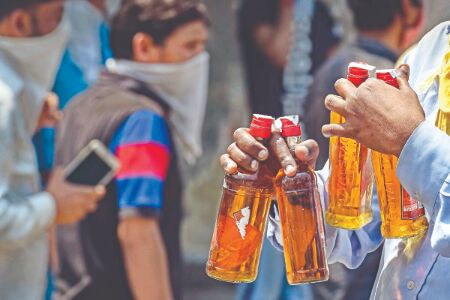How poorly spread vends, among others, triggered govt's exit from retail liquor

new delhi: While the Delhi government's announcement on privatising retail liquor in the city and launching the new Excise Policy was justified with the objective to end liquor mafia, according to expert committee meetings, group of ministers deliberations and public grievances, the root cause of the problem was a poor distribution of liquor stores in Delhi and the imbalance in revenue between government and private stores in addition to safety and quality control issues.
While announcing the policy on Monday, Deputy Chief Minister Manish Sisodia went as far as to say the uneven distribution was "the fundamental reason why in Delhi liquor mafias work".
"You all know that Delhi has 272 wards out of which there are 79 wards with zero liquor shops. Around 45 wards have just one shop. Around 58 per cent of Delhi is either unserved or underserved," Sisodia explained. Only eight percent of the city is "normally served" in 37 wards which have more than three liquor shops each.
"On the other hand, there are 54 wards in Delhi where liquor is over-served, some of these wards have more than 10 shops. This means in 20 per cent of Delhi, liquor is over-served. It is also to be noted that 50 per cent of liquor shops in Delhi are present in just 45 wards. This clearly shows that in Delhi the liquor sale distribution is very unequal," he added.
The data suggested that the maximum revenue comes from 189 liquor shops spread across 46 wards. "This also shows that from other areas misappropriation of revenue is taking place," the Deputy CM concluded.
Moreover, the 40 per cent private liquor shops in Delhi earn more revenue for the government here than what comes in from its own retail stores, which comprise 60 per cent of stores in the city.
"So we have decided that the government will get out of the liquor retail business. Because revenue leakage in government shops is taking place," he said.
"The Delhi government will set up an international standard checkup system by which we will keep a watch on low-quality liquors and stop their distribution. An international quality lab will be set up to test the quality of liquor coming into the city," Sisodia said.
The new policy makes it mandatory for any liquor shop to be spread across a minimum of 500 sq ft. The new policy also comes down heavily against people drinking outside the shop. The shops will not have counters facing towards the road with pickup and drop of liquor taking place only inside the shop and not outside.
"If needed they (shop owners) can take the help of police or CCTV or security guard but ensuring law and order will be the responsibility of the liquor shop owners," he said.
The government has also taken steps to abolish various obsolete licensing systems related to retail liquor sale that affect the growth of the business. "Today we have decided that in a bid to ease doing business, we will merge various licenses. We have removed all old policies which had no real benefit. Licenses made it more rational to help the business pickup after Covid," Sisodia said.
Delhi has around 850 registered liquor shops but reports have shown that more than 2,000 are run by liquor mafias, the Minister said. Since 2016, the Delhi Government has not allowed any new liquor shops to open and it will not do so in the foreseeable future.



